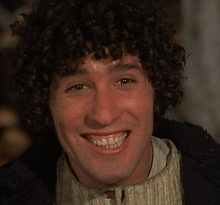Ninetto Davoli
| Ninetto Davoli | |
|---|---|
 Davoli in The Canterbury Tales (1972) | |
| Born |
11 October 1948 San Pietro a Maida, Calabria, Italy |
| Occupation | Actor |
Giovanni "Ninetto" Davoli (born 11 October 1948) is an Italian actor who became known through his roles in several of Pier Paolo Pasolini's films.
Biography
Davoli was born in San Pietro a Maida, Calabria. He was discovered by poet, novelist and film director Pier Paolo Pasolini, who had begun a relationship with Davoli, then a 15 year old boy, in 1963. Pasolini considered him to be "the great love of his life," whom he later cast in his 1966 film Uccellacci e uccellini (literally Bad Birds and Little Birds but translated in English as The Hawks and the Sparrows), co-starred with celebrated comic Totò, Pasolini became the youth's mentor and friend. "Even though their sexual relations lasted only a few years, Ninetto continued to live with Pasolini and was his constant companion, as well as appearing in six more of his films."[1]
First cast in a non-speaking role in the film Il vangelo secondo Matteo (The Gospel According to St. Matthew, 1964), Davoli played mostly comical-naïve roles in several more of Pasolini's films, the last of which was Il fiore delle Mille e una Notte (A Thousand and One Nights/Arabian Nights, 1974).
After Pasolini's death in 1975, Davoli turned increasingly to television productions.
Selected filmography
Film
- Il vangelo secondo Matteo (The Gospel According to St. Matthew, 1964) (Pasolini)
- Uccellacci e uccellini (The Hawks and the Sparrows, 1966) (Pasolini)
- Requiescant (1967)
- Le streghe (1967) (Pasolini)
- Capriccio all'Italiana (1967) (Pasolini)
- Edipo re (Oedipus Rex, 1967) (Pasolini)
- Caprice Italian Style (1968)
- Teorema (Theorem, 1968) (Pasolini)
- Porcile (Pigsty, 1969) (Pasolini)
- Amore e rabbia (1969) (Pasolini)
- Ostia (1970)
- Il Decameron (The Decameron, 1971) (Pasolini)
- Er più - storia d'maore e di coltello (1971)
- Storia di fifa e di coltello - er seguito del più (1972)
- Il maschio ruspante (1972)
- I Racconti di Canterbury (The Canterbury Tales, 1972) (Pasolini)
- La Tosca (1973)
- Storie scellerate (1973)
- Il lumacone (1974)
- Appassionata (1974)
- Amore mio, non farmi male (1974)
- Unbelievable Adventures of Italians in Russia (1974)
- Il fiore delle Mille e una Notte (A Thousand and One Nights/Arabian Nights, 1974) (Pasolini)
- Pasqualino Cammarata... capitano di fregata (1975)
- Frankenstein all'italiana (1975)
- Qui comincia l'avventura (1975)
- Il vizio ha le calze nere (1975)
- Prendimi, straziami che brucio di passione (1975)
- L'agnese va a morire (1976)
- Amore all'arrabbiata (1976)
- Spogliamoci, così senza pudor (1976)
- No alla violenza (1977)
- Casotto (1977)
- Malabestia (1978)
- La liceale seduce i professori (1979)
- Buone notizie (1979)
- Maschio.. femmina... fiore... frutto (1980)
- Il cappotto di Astrakan (1980)
- A zsarnok szíve, avagy Boccaccio Magyarországon (The Tyrant's Heart, 1981)
- Il minestrone (1981)
- Il conte Tacchia (1982)
- Marie Ward (1985)
- Occhei, occhei (1986)
- Momo (1987)
- Animali metropolitani (1987)
- Le rose blu (1996)
- La ragazza del metrò (1989)
- L'anno prossimo vado a letto alle dieci (1995)
- I magi randagi (1996)
- Cinématon #1824 (1997)
- Una vita non violenta (1999)
- Uno su due (2006)
Television
- Le avventure di Calandrino e Buffalmaco (1975) - mini-series
- Addavenì quel giorno e quella notte (1979)
- Sogni e bisogni (1985) - mini-series
- L'altro enigma (1988) - mini-series
- La romana (1989)
- Il vigile urbano (1995) - series
- L'avvocato porta (1997) - mini-series
- La banda (2000)
- Vite a prendere (2004)
Sources
- Siciliano, Enzo (1982). Pasolini: A Biography. New York: Random House. p. 167.
- ↑ Ireland, Doug (4 August 2005). "Restoring Pasolini". LA Weekly (LA Weekly, LP). Retrieved 29 August 2010.
External links
|